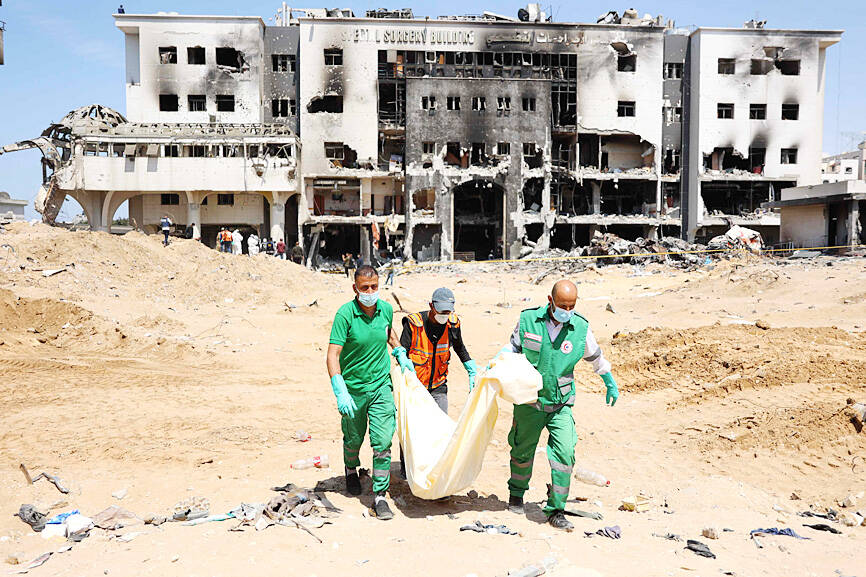The leaders of France, Egypt and Jordan on Monday warned Israel against a threatened offensive in the southern Gaza city of Rafah, urging an “immediate” ceasefire in its war against Hamas.
“We warn against the dangerous consequences of an Israeli offensive on Rafah, where more than 1.5 million Palestinian civilians have sought refuge,” they said in a joint editorial published in several newspapers. “Such an offensive will only bring more death and suffering, heighten the risks and consequences of mass forcible displacement of the people of Gaza and threaten regional escalation.”
The editorial was signed by French President Emmanuel Macron, Egyptian President Abdel Fattah al-Sisi and Jordan’s King Abdullah II.

Photo: AFP
The US earlier said that it opposes any assault on Rafah, after Israeli Prime Minister Benjamin Netanyahu said a date for an attack had been set.
The three leaders urged that a UN Security Council resolution calling for an “immediate ceasefire ... be fully implemented without further delay,” and that all hostages held by Hamas be released, also in line with the council’s demands.
“The war in Gaza and the catastrophic humanitarian suffering it is causing must end now,” the three leaders said in the editorial published by Le Monde in France, the Washington Post in the US, al-Rai in Jordan and al-Ahram in Egypt.
They called for a “massive increase” in aid being allowed into Gaza.
Israel is under growing international pressure to agree to a ceasefire, including from its top ally and arms supplier the US, while Hamas on Monday said that it was studying a proposal for a truce and hostage-prisoner swap after talks in Cairo.
Israeli Minister of Defense Yoav Gallant said it was the right time for a deal, six months into a war with the Islamist militants in Gaza, but while negotiations continued, Netanyahu said a date has been set for sending troops into Rafah.
The US Department of State said that an invasion would have “an enormously harmful effect” on civilians, and ultimately Israeli security.

‘UNUSUAL EVENT’: The Australian defense minister said that the Chinese navy task group was entitled to be where it was, but Australia would be watching it closely The Australian and New Zealand militaries were monitoring three Chinese warships moving unusually far south along Australia’s east coast on an unknown mission, officials said yesterday. The Australian government a week ago said that the warships had traveled through Southeast Asia and the Coral Sea, and were approaching northeast Australia. Australian Minister for Defence Richard Marles yesterday said that the Chinese ships — the Hengyang naval frigate, the Zunyi cruiser and the Weishanhu replenishment vessel — were “off the east coast of Australia.” Defense officials did not respond to a request for comment on a Financial Times report that the task group from

DEFENSE UPHEAVAL: Trump was also to remove the first woman to lead a military service, as well as the judge advocates general for the army, navy and air force US President Donald Trump on Friday fired the chairman of the Joint Chiefs of Staff, Air Force General C.Q. Brown, and pushed out five other admirals and generals in an unprecedented shake-up of US military leadership. Trump wrote in a post on Truth Social that he would nominate former lieutenant general Dan “Razin” Caine to succeed Brown, breaking with tradition by pulling someone out of retirement for the first time to become the top military officer. The president would also replace the head of the US Navy, a position held by Admiral Lisa Franchetti, the first woman to lead a military service,

Four decades after they were forced apart, US-raised Adamary Garcia and her birth mother on Saturday fell into each other’s arms at the airport in Santiago, Chile. Without speaking, they embraced tearfully: A rare reunification for one the thousands of Chileans taken from their mothers as babies and given up for adoption abroad. “The worst is over,” Edita Bizama, 64, said as she beheld her daughter for the first time since her birth 41 years ago. Garcia had flown to Santiago with four other women born in Chile and adopted in the US. Reports have estimated there were 20,000 such cases from 1950 to

CONFIDENT ON DEAL: ‘Ukraine wants a seat at the table, but wouldn’t the people of Ukraine have a say? It’s been a long time since an election, the US president said US President Donald Trump on Tuesday criticized Ukrainian President Volodymyr Zelenskiy and added that he was more confident of a deal to end the war after US-Russia talks. Trump increased pressure on Zelenskiy to hold elections and chided him for complaining about being frozen out of talks in Saudi Arabia. The US president also suggested that he could meet Russian President Vladimir Putin before the end of the month as Washington overhauls its stance toward Russia. “I’m very disappointed, I hear that they’re upset about not having a seat,” Trump told reporters at his Mar-a-Lago resort in Florida when asked about the Ukrainian